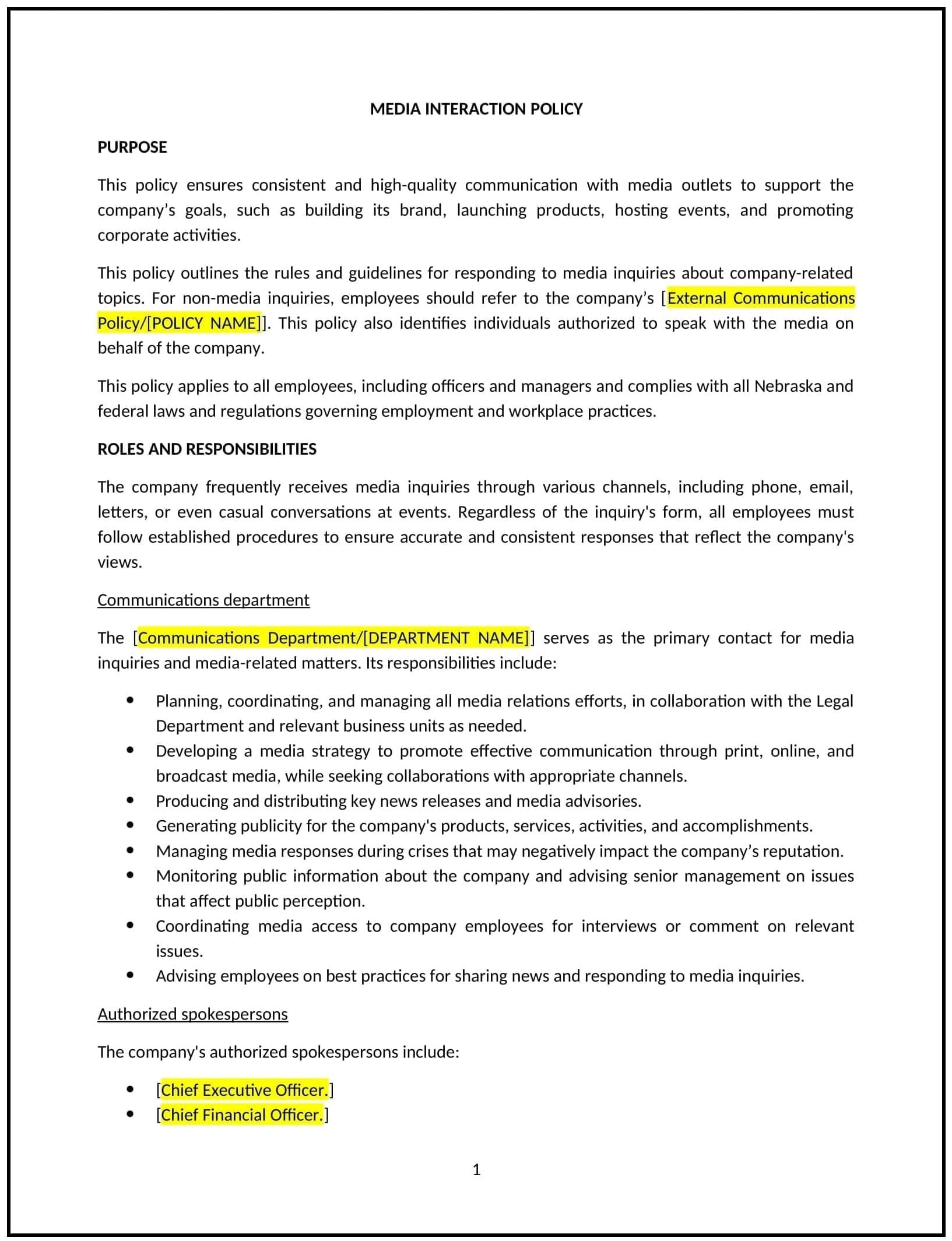Got contracts to review? While you're here for policies, let Cobrief make contract review effortless—start your free review now.

Customize this template for free
Media relations policy (Nebraska)
A media relations policy helps Nebraska businesses manage their interactions with the media and the public. This policy outlines how employees should handle media inquiries, press releases, public statements, and other forms of media communication. It is designed to ensure that all external communications are consistent, professional, and aligned with the company’s values and strategic goals. The policy also helps businesses maintain control over their public image and avoid potential risks associated with miscommunication or negative press.
By adopting this policy, businesses in Nebraska can build positive relationships with the media, effectively manage their public image, and communicate key messages in a clear and consistent manner.
How to use this media relations policy (Nebraska)
- Define the role of media relations: Specify who is responsible for managing media relations within the company, such as the communications or public relations team, and outline the process for handling media inquiries and outreach. Typically, media inquiries should be directed to designated spokespeople or PR staff.
- Establish approval protocols: Clarify that all media communications, including press releases, statements, and interviews, must be approved by designated personnel before being released to the public. This helps ensure consistency and prevents unauthorized statements from being made.
- Outline guidelines for media contact: Employees should be advised on how to handle media inquiries. Unless authorized, employees should not speak on behalf of the company or provide confidential information. The policy should specify that all media requests should be referred to the media relations team or a designated spokesperson.
- Set expectations for public statements: Define the process for issuing public statements, including press releases, blog posts, or social media communications. Specify how the company will respond to issues such as product launches, crises, or negative press, and ensure that all statements align with the company’s values and messaging.
- Handle sensitive topics with care: Establish guidelines for communicating on sensitive topics, such as financial performance, legal matters, employee relations, or crises. Employees should be trained on how to address these topics in a way that maintains confidentiality and protects the company’s reputation.
- Promote transparency and honesty: Encourage transparency in media interactions while ensuring that any information shared is accurate, well-considered, and in line with the company’s policies. The policy should stress the importance of honesty in all communications with the media.
- Provide crisis communication guidelines: Develop a framework for addressing crises or emergencies involving the company, including how to respond to negative press, accusations, or other urgent situations. Designate a crisis communications team to handle these situations quickly and efficiently.
- Review and update: Periodically review and update the policy to ensure it remains relevant to the changing media landscape, industry trends, and Nebraska state laws regarding public communication. The policy should also be updated to reflect any changes in the company’s operations or goals.
Benefits of using this media relations policy (Nebraska)
This policy provides several benefits for Nebraska businesses:
- Protects the company’s reputation: By managing media interactions proactively and ensuring that all communications are aligned with the company’s values, businesses can maintain a positive public image and mitigate risks associated with negative press.
- Ensures consistent messaging: A well-defined media relations policy ensures that all employees, especially those engaging with the media, deliver consistent and clear messages that align with the company’s strategic objectives.
- Improves media relationships: By establishing clear protocols and points of contact, businesses can foster stronger, more productive relationships with the media, helping to improve media coverage and reputation over time.
- Reduces legal risks: By controlling what information is released to the media, businesses can reduce the risk of releasing confidential or damaging information that could result in legal action or regulatory fines.
- Supports crisis management: The policy provides a structured framework for addressing crises, ensuring that the company can respond to urgent situations quickly, effectively, and in a way that minimizes damage to its reputation.
Tips for using this media relations policy (Nebraska)
- Communicate the policy clearly: Ensure that all employees, especially those in customer-facing or public relations roles, are familiar with the media relations policy and know how to handle media inquiries. The policy should be included in employee handbooks and accessible to all staff.
- Designate spokespeople: Identify and train key spokespeople who will represent the company in media interactions. Ensure that these individuals are prepared to speak on behalf of the company, provide accurate information, and manage difficult questions effectively.
- Monitor media coverage: Regularly monitor media coverage of the company to identify potential issues early and respond appropriately. This helps businesses stay on top of public perceptions and manage media relations proactively.
- Provide media training: Offer media training for key employees or spokespeople to ensure that they understand how to interact with journalists, handle tough questions, and deliver consistent messages.
- Be prepared for crises: Have a crisis communication plan in place that can be quickly activated in the event of a negative news story or emergency situation. This plan should include clear guidelines for issuing public statements, addressing the media, and managing any fallout.
- Review and update regularly: Review the policy periodically to ensure that it remains up-to-date with changes in the media landscape, company goals, and Nebraska laws. Regular updates will keep the policy relevant and effective.